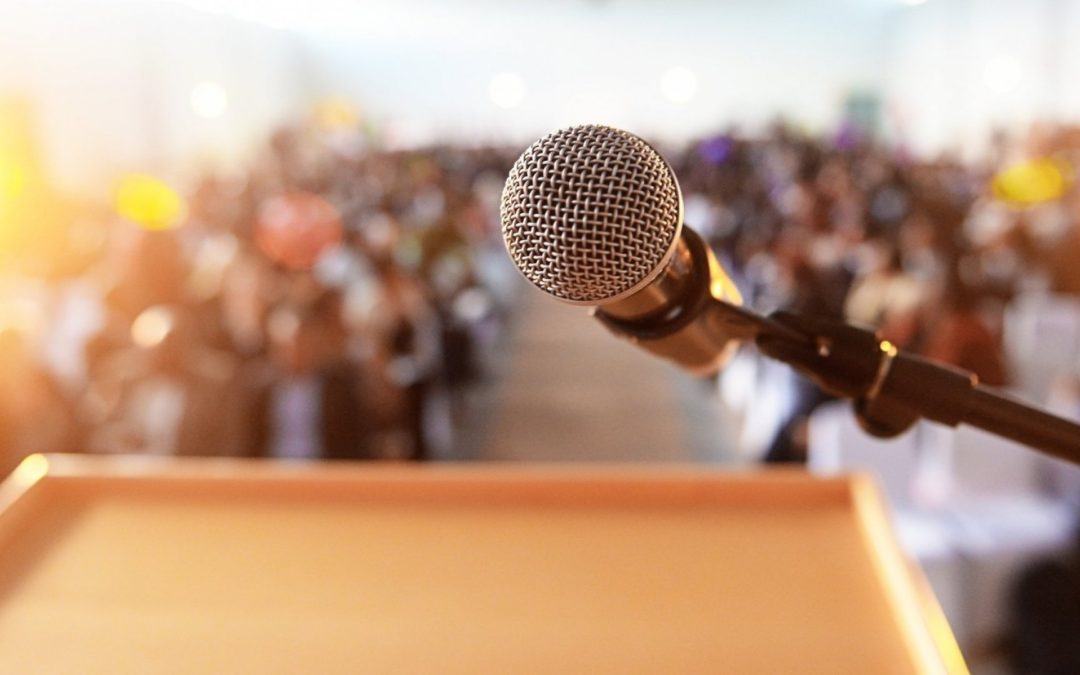Glossophobia is the fear of public speaking – and, it’s real. It’s believed that 75% of humans have some element of fear when it comes to public speaking. I’m guessing another 20% are lying!
According to Craig N. Sawchuk, Ph.D., L.P. of the Mayo Clinic, “Fear of public speaking is a common form of anxiety. It can range from slight nervousness to paralyzing fear and panic. Many people with this fear avoid public speaking situations altogether, or they suffer through them with shaking hands and a quavering voice. But with preparation and persistence, you can overcome your fear.”
The security industry needs great communicators and being an effective speaker is a powerful skill to have. Whether you’re a direct sales professional working with a potential customer or an executive speaking to a group of potential investors, the better your presentation, the better your chances for success.
Being a great speaker doesn’t come naturally to most of us. It takes a lot persistence and practice. To help you become a better speaker, I want to share these tips offered by Harvard’s Carmine Gallo.
1. Great presenters use fewer slides — and fewer words.
Reduce clutter where you can.
“Senior McKinsey partners have told me that recent MBA hires often try to dazzle clients with their knowledge — and they initially do so by creating massive PowerPoint decks. New consultants quickly learn, however, that less is much more…This is because great writers and speakers are also great editors. It’s no coincidence that some of the most memorable speeches and documents in history are among the shortest. The Gettysburg Address is 272 words, John F. Kennedy’s inauguration speech was under 15 minutes, and the Declaration of Independence guarantees three unalienable rights, not 22.”
2. Great presenters don’t use bullet points.
Complement text on slides with photos, videos, and images.
“Experiments in memory and communication find that information delivered in pictures and images is more likely to be remembered than words alone. Scientists call it ‘pictorial superiority.’ According to molecular biologist John Medina, our ability to remember images is one of our greatest strengths.”
“We are incredible at remembering pictures,’ he writes. ‘Hear a piece of information, and three days later you’ll remember 10% of it. Add a picture and you’ll remember 65%.”
John Medina
3. Great presenters enhance their vocal delivery.
Don’t underestimate the power of your voice to make a positive impression on your audience.
“In summary, the research states that effective persuaders modulate their voice, and by doing so, appear to be more confident in their argument. For example, they raise their voice when emphasizing a key message, or they pause after delivering an important point.”
4. Great presenters create “wow” moments.
Give your audience something extra.
“While giving a presentation on the efforts of the Bill & Melinda Gates Foundation to reduce the spread of malaria, Gates stated: “Now, malaria is, of course, transmitted by mosquitos. I brought some here just so you could experience this.” And with that, he walked out to the center of the stage, and opened the lid from a small jar containing non-infected mosquitoes.”
“We’ll let those roam around the auditorium a little bit.”
“Unexpected moments grab an audience’s attention because the human brain gets bored easily. According to neuroscientist, A.K Pradeep, whom I’ve interviewed: ‘Novelty recognition is a hardwired survival tool all humans share. Our brains are trained to look for something brilliant and new, something that stands out, something that looks delicious.’”
5. Great presenters rehearse.
Put in the time to make yourself great.
“Consider Martin Luther King, Jr. His most famous speeches came after years of practice — and it was exactly this level of mastery that gave King the awareness and flexibility to pull off an advanced speaking technique: improvisation. King improvised the memorable section of what is now known as the “Dream Speech” on the steps of the Lincoln Memorial. When he launched into the “I have a dream” refrain, the press in attendance were confused. Those words were not included in the official draft of the speech they had been handed. King read the mood of his audience and, in the moment, combined words and ideas he had made in previous speeches.”
“It’s believed that King gave 2,500 speeches in his lifetime. If we assume two hours of writing and rehearsals for each one (and in many cases he spent much more time than that), we arrive at the conservative estimate of 5,000 hours of practice. But those are speeches. They don’t take into account high school debates and hundreds of sermons. King had easily reached 10,000 hours of practice by August of 1963.”
When done well, speaking is communication that creates opportunities. Spend time honing your speaking skills — it’ll pay of in many ways, including clear understanding and better relationships. This is good for business and good for life.


Recent Comments